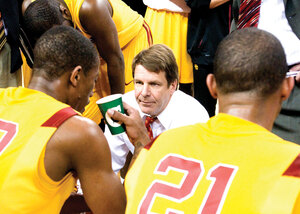Allegations hurting USC image
In light of the pending NCAA investigation into the USC football and basketball programs, the question on everyone’s mind has been, “How?”
How could this have slipped through the cracks of one of the most prestigious athletic and academic universities in the country? And, if true, how could something that seems so overwhelmingly wrong have been allowed to occur?

Long gone · Former men’s basketball coach Tim Floyd resigned from the team in June amid allegations that he gave cash to a confidant of O.J. Mayo’s. The public relations storm around the university has been fierce. - Nathaniel Gonzalez | Daily Trojan
Controversies such as those facing USC are a dime a dozen these days, as the media uncovers deeper information at increasingly lower levels and smaller institutions. Most recently, Michigan’s football program was accused of exceeding practice time limits. Last week, Memphis’s basketball program was forced to vacate all 38 of its wins from the 2007-08 season because of an SAT violation likely involving former guard Derrick Rose.
The public relations impact from the accusation of violations — even if they are only accusations — are nightmarish for universities. In the Trojans’ case, doubt has entered the minds of those who hoped USC would be a pillar in these dark times for college athletics.
The allegations levied against USC involving improper allowances and recruiting violations regarding former USC guard O.J. Mayo surfaced last year. The allegations against former running back Reggie Bush broke nearly three years ago.
Despite the fact that no decision has come from the NCAA regarding alleged USC infractions, round-the-clock media coverage has hurt the reputation of the university.
Michael L. Jackson, vice president for Student Affairs, knows all too well the impact of the claims and the deep-seated impact of the reports.
“There are a couple of things we know — [these accusations are] not what the president wants, that’s not what the trustees want, that’s not what you or I want,” Jackson said in an interview this summer. “Some individuals do stupid things, and it definitely sullies the reputation of the university.”
The public relations impact has been felt everywhere, from the highest university officials to the average student, whose own reputation sometimes rests upon that of the university they have chosen to attend.
“I love the team so much, and I love the school so much, but at the same time, it’s disappointing to me that this kind of stuff happens, because it makes us look bad,” said David Johnson, a sophomore majoring in biomedical engineering.
Many students who have seen the effects of the scandal wreak havoc on the credibility of the school remain conflicted about what they should be feeling.
“You don’t want your school to look bad because your school is supposed to be a representation of you,” Johnson said.
Daniel Weidlein, a sophomore majoring in jazz studies, also finds fault in the scandals, but wants to stay optimistic.
“Whenever there is a scandal, I want to believe that the person is innocent,” Weidlein said. “I try to find other ways to rationalize it, like, ‘Oh, I’m sure every other school is doing it because USC is under such a spotlight.’”
Weidlein also sees a visible decrease in not only his own interest in the basketball team, but in others’ interests as well.
“I feel like I hardly want to go to basketball games this season,” Weidlein said. “Among people who care about sports, interest has definitely decreased.”
In the future lies a conclusion to the story — a way to remedy the public opinion of the university — but when or where that will come, even Jackson does not know.
“You wish these things could be brought to a conclusion and I think nobody wants to bring it more to a conclusion than we do,” Jackson said. “But life goes on, and you just know that that’s hanging out there. Look at these things, they just drag on forever,”
James Grant, executive director of USC public relations, sees the light at the end of the tunnel.
“We’re all just monitoring the situation and we’re hoping for a good and fair outcome,” Grant said.
The place where the university hurts most as a result of such allegations is in the eyes of the public, and, for the time being, university public relations are somewhat powerless to combat any of the rumors or allegations that have arisen until they are satisfied with their own investigation.
“These kinds of things are always fodder for talk radio and personal opinion; those things will happen, but we will wait until the process is concluded,” Grant said.
He recognizes that it is hard for the university to effect a large change in public opinion when the facts have not all come out.
“In our pledging to get to the bottom of it and clarify what happened when, that’s our attempt to assure everybody that we do care about these things, and expect everyone that works here to adhere to the standards that are set,” Grant said.
It may be some time until Grant and Jackson can see the investigation all the way through and begin the healing process that will likely be needed to remedy the hit the university has taken in the court of public opinion.
